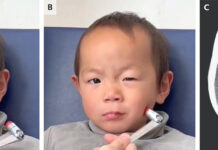Hyperthermia can be caused by psychological stress as well based on reports. Moreover, persistent excessive hyperthermia can lead to hypercytokinemia and cause damage to the organs. This case report is of a similar instance where postoperative hyperthermia led to systemic inflammatory response and failure of multiple organs in a child with Down syndrome.
The ten-month-old native Japanese boy had Down syndrome and Hirschsprung’s disease. Moreover, his newborn screening revealed congenital hypothyroidism and a ventral septal defect. However, these conditions stabilized after the administration of levothyroxine and furosemide. Additionally, his development was the same as that of a child with Down syndrome.
The child developed a high fever without any infection twice after preoperative preparations. Once at the age of eight months and once again at the age of nine months. Moreover, he was admitted to the hospital again at ten months for undergoing Soave procedure to correct his Hirschsprung’s disease. But he contracted a fever soon after the surgical procedure.
42 degree Celsius hypothermia was stubborn to acetaminophen treatment. Additionally, deterioration of multiple organs leading to organ failure was seen because of hypercytokinemia. Moreover, his serum levels were also increased. He died on day 2 after the surgery with hypoxemia, respiratory acidosis, metabolic acidosis, increased serum transaminase levels, reduced coagulation, and pancytopenia. However, doctors could not identify the multiple infectious and noninfectious causes of hyperthermia through blood cultures or tests.
Conclusion
It has been speculated that the cause of the fever was psychological stress since the child went through frequent hyperthermia episodes after the invasive procedure.
The child had hyperthermia in addition to the disorders of the immune system in association with Down syndrome. It could have been the inducing factor of hypercytokinemia and multiple organ failure. However, this rare case of non-infectious post-operative hyperthermia, which led to multiple organ failures can give some insight into the currently unclear pathogenic mechanisms of hyperthermia. Additionally, it can also shed light on the associated multiple organ failure during the preoperative phase.




